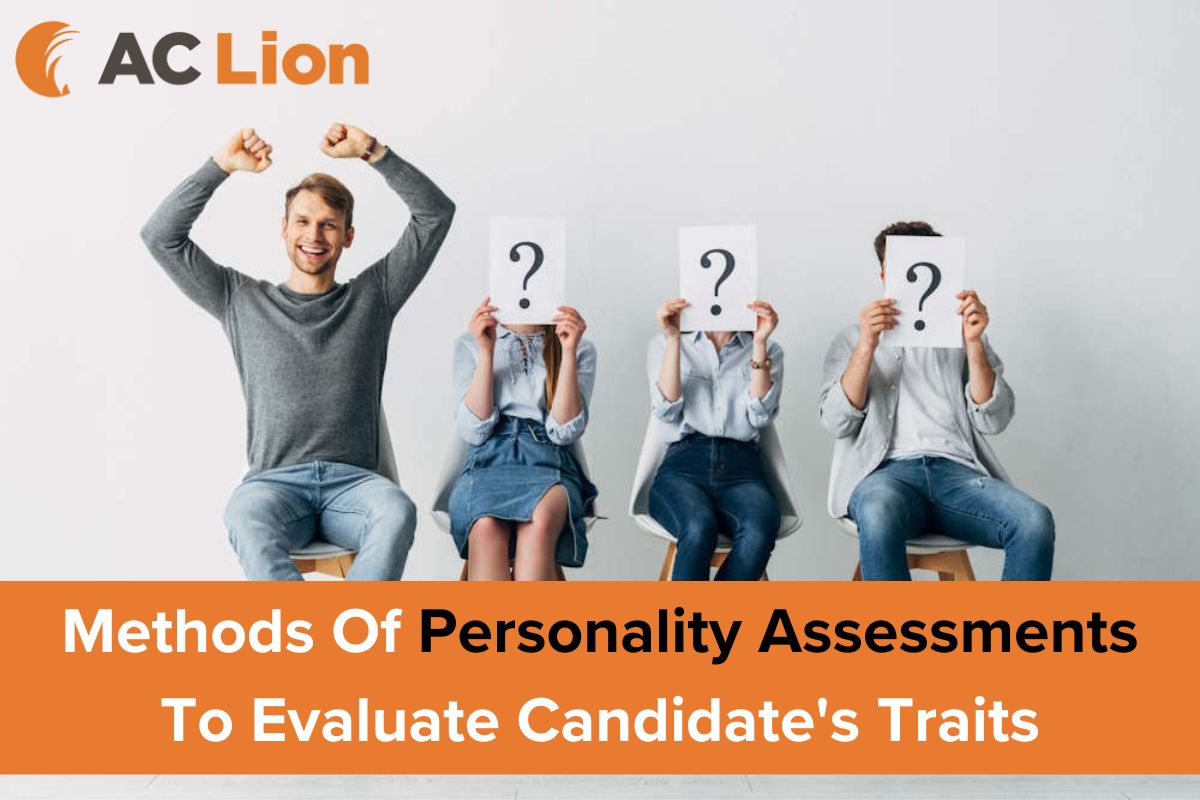Different Methods Of Personality Assessments To Evaluate Candidate’s Traits


Understanding job candidates during the hiring process is essential to selecting the right hires to help your organization grow. The modern recruitment process includes a variety of strategies to assess a candidate’s personality and ability to meet job requirements, including personality assessments – an assessment that allows leaders to understand a candidate’s behavior, work style, and cultural fit with the company.
Methods Of Personality Assessments
From psychometric testing to behavioral interviews and AI integration, there are many methods of personality assessments in recruitment to consider as you approach the hiring process. This article provides a breakdown of different options for personality testing in HR to make the right decision for your business. Let’s get started:
1. Traditional Questionnaires and Surveys
Questionnaires and surveys are traditional candidate evaluation methods that help assess traits like conscientiousness, agreeableness, and emotional stability – critical traits in promoting positive job performance.
There are numerous options for these questionnaires and surveys, such as the Myers-Briggs Type Indicator (MBTI), which measures psychological preferences and behaviors to understand how candidates perceive the world. An MBTI assessment promotes self-awareness and improvement while allowing you to identify individual differences between candidates that can make one option more suitable for your business.
Another option is the DISC assessment, a personal assessment tool that categorizes people into D, I, S, and C personality types. Each personality type has unique strengths and characteristics that can help you determine whether a candidate fits your business.
2. Behavioral Interviews
Behavioral interviews are a potential evaluation method to assess whether a candidate suits your business, focusing on how past behavior predicts future job performance. Behavioral interviews test for traits like resilience, adaptability, and teamwork to determine a candidate’s ability to help your organization thrive.
Some potential questions you might ask during behavioral interviews include:
- How have you dealt with difficult situations and customers in the past? Provide examples.
- Describe a time at work when you were asked to complete a task you’d never done before. How did you react to this situation, and what did you learn from it?
- What’s the most interesting thing about yourself that isn’t found on your resume?
- How have you navigated situations in the past where you attempted to communicate a concept to another person who didn’t understand you?
- Describe the biggest change you’ve faced at work. How did you successfully adapt to the change?
When the candidate responds to your questions, look for patience, flexibility, eagerness, passion, and self-reflection.
3. Role-Playing and Simulations
Understanding how candidates respond to specific situations can help you determine whether they fit the role. One of the most popular personality assessments in recruitment is role-playing in recruitment – a process that allows you to assess each candidate’s decision-making skills, conflict resolution abilities, and leadership qualities.
These simulations are designed to emulate common scenarios or situations that could threaten the business, ensuring the candidate can respond effectively if something goes wrong. Candidates might be asked to act out specific situations like breaches, unsatisfied customers, tight deadlines, and more.
4. Psychometric Testing
Psychometric testing is another option to assess candidates for specific roles. These tests measure a candidate’s behavioral style and mental capabilities, ensuring you choose suitable candidates based on how well they match the characteristics of a specific role.
One psychometric test to consider is a Big Five personality traits assessment, which tests for a candidate’s conscientiousness, extraversion, openness, neuroticism, and agreeableness. This test and other personality assessments like AC Lion EQ can help you determine whether a candidate will thrive in the open role.
5. Gamified Assessments
You can also consider gamified assessments – tests where game elements determine traits like problem-solving skills, risk-taking, creativity, and more. Soft skills evaluation through gamification, leverages the interactive and immersive nature of games to assess these crucial competencies. Gamified assessments like AssessmentDay are more engaging and less stressful than other methods like psychometric testing. Because of their engaging nature, you can get the most out of each candidate.
These tools effectively reveal a candidate’s ability to meet your job’s requirements without overwhelming and non-engaging assessments that don’t have the intended results.
6. Social Media Analysis
Social media says a lot about a person, and social media analysis in hiring is an increasingly popular option for assessing candidates and their values. A candidate’s social media profiles provide detailed information about their personality, including interests, passions, communication style, and more.
There are some ethical considerations in assessments before choosing social media analysis as your primary assessment method. For example, when not conducted correctly, a social media assessment can violate a candidate’s privacy. Potential biases might arise if you see something you disagree with on the candidate’s profile that doesn’t necessarily impact their ability to perform well on the job.
There are limitations to this method, and while you can use social media assessments to get a general idea of a candidate’s personality, remember that social media isn’t always accurate to real life.
7. Peer Reviews and References
One of the top candidate evaluation methods lies in peer reviews and references. Understanding how a candidate’s colleagues, managers, and previous employers see the candidate’s personality and capabilities can help you determine whether they’re a good fit for your business.
You can collect this feedback by contacting candidates’ past employers and colleagues and offering a questionnaire asking specific questions related to the candidate’s performance and capabilities. Always consider the context in which this feedback is given – context can influence the effectiveness of responses.
8. Group Activities and Team Assessments
A comprehensive team dynamics evaluation is critical to finding the perfect candidate for open positions. Teamwork is everything regarding your business – and ensuring candidates value teamwork and can contribute to a team is vital in your final decision.
Some assessment options include group discussions and problem-solving exercises where candidates must collaborate to find a solution. These activities help reveal each candidate’s interpersonal skills, leadership potential, and cooperativeness, leading to better hiring decisions.
Can Personality Assessments Predict Job Performance Accurately?
While there’s no be-all-end-all solution to assess a candidate’s ability to perform well on the job, personality assessments can greatly contribute to predicting future job performance. However, it’s important to note that some studies have found personality assessments unreliable in predicting future job performance – meaning it’s best to use these assessments as a helpful tool to make hiring decisions, but not as your only resource for deciding.
What is the Role of AI in Personality Assessments for Recruitment?
As personality assessments for hiring evolve, more solutions are integrating AI technologies. AI promotes greater efficiency in hiring processes and contributes to accurate, data-driven decision-making, which can help you make better hiring decisions.
However, it’s important to remember that there are some limitations to AI’s hiring capabilities. For instance, an overreliance on technology to make hiring decisions ignores important elements only a human can identify, like a candidate’s cultural fit with the organization.
What Ethical Considerations Are Involved in Using Personality Assessments?
It’s also important to understand ethical considerations in assessments, such as privacy, consent, and potential biases in personality testing. Always inform candidates about the testing process to ensure they consent to the experience, especially if it involves something like a social media analysis.
Approach the process from an unbiased perspective – while the candidate’s personal views might not always align with your own, focus on their ability to meet the job’s requirements.
What Are the Limitations of Traditional Personality Assessments in Recruitment?
It’s important to understand that traditional personality assessments have limitations that make them unsuitable as the sole deciding factor in the hiring process. Many personality assessments provide a lack of context important to a hiring decision, while others oversimplify complex traits that could make a candidate suitable for a position.
There is also the potential for inaccuracies in these tests or misinterpretations of the assessments if you aren’t sure what to look for – so always have other ways of assessing a candidate besides personality tests.
How Can Personality Assessments Be Tailored for Different Job Roles?
Customizing personality tests to fit different job roles is important to maximize the benefits of these assessments. Consider specific job requirements, industry needs, and common tasks that the candidate will be expected to complete and incorporate these elements into your assessments.
Different roles will require different personality tests – for instance, hiring someone for leadership or senior-level positions will require a unique assessment compared to hiring an entry-level employee.
What Are the Latest Trends in Personality Assessments for Candidates?
There are emerging trends in personality assessments for candidates – some of the most popular emerging technologies incorporate AI, gamification, and data analytics into the assessment process. These advancements are helping shape the future of recruitment, which will rely increasingly on technology.
Are There Specific Personality Traits That Are More Predictive of Success in Certain Industries?
Depending on your industry and the role you’re hiring for, some personality traits can be more predictive of success than others. For example, an assessment for a sales professional might focus more on a candidate’s persuasion skills than other traits.
Integrating Multiple Methods for a Holistic View
Using a diverse range of assessment methods is critical to gaining a comprehensive understanding of a candidate’s personality and ability to meet job requirements. It’s important to take a balanced approach that combines objective testing with subjective evaluation to make the most of personality assessments.
Recruitment is simple when you have the resources you need to succeed. Learn more about different hiring strategies with ACLion today!
